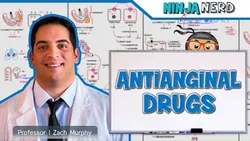
Antianginal Drugs 
This course provides an overview of antianginal drugs, including beta blockers, calcium channel blockers, and nitrates. It covers the pathophysiology of angina, as well as treatment algorithms for each drug. It is designed to help healthcare professionals understand the use of these drugs in the management of angina. ▼
ADVERTISEMENT
Course Feature
![]() Cost:
Cost:
Free
![]() Provider:
Provider:
Youtube
![]() Certificate:
Certificate:
Paid Certification
![]() Language:
Language:
English
![]() Start Date:
Start Date:
On-Demand
Course Overview
❗The content presented here is sourced directly from Youtube platform. For comprehensive course details, including enrollment information, simply click on the 'Go to class' link on our website.
Updated in [February 21st, 2023]
1. Pathophysiology of Angina: Learners can gain an understanding of the underlying causes of angina, including the anatomy and physiology of the heart, the role of coronary arteries, and the effects of atherosclerosis. This knowledge can help learners better understand the treatments available for angina and how they work.
2. Beta Blockers: Learners can gain an understanding of the use of beta blockers in the treatment of angina. This includes the mechanism of action, the types of beta blockers available, and the potential side effects. This knowledge can help learners make informed decisions about the use of beta blockers in their own treatment plans.
3. Calcium Channel Blockers: Learners can gain an understanding of the use of calcium channel blockers in the treatment of angina. This includes the mechanism of action, the types of calcium channel blockers available, and the potential side effects. This knowledge can help learners make informed decisions about the use of calcium channel blockers in their own treatment plans.
4. Nitrates: Learners can gain an understanding of the use of nitrates in the treatment of angina. This includes the mechanism of action, the types of nitrates available, and the potential side effects. This knowledge can help learners make informed decisions about the use of nitrates in their own treatment plans.
5. Ranolazine: Learners can gain an understanding of the use of ranolazine in the treatment of angina. This includes the mechanism of action, the types of ranolazine available, and the potential side effects. This knowledge can help learners make informed decisions about the use of ranolazine in their own treatment plans.
[Applications]
After completing this course, students should be able to apply the knowledge they have gained to identify and treat angina. They should be able to recognize the different types of antianginal drugs, understand their mechanisms of action, and be able to create treatment algorithms for each type of drug. Additionally, students should be able to apply their knowledge to solve practice problems related to antianginal drugs.
[Career Paths]
1. Clinical Pharmacist: Clinical pharmacists specialize in the safe and effective use of medications. They work with physicians and other healthcare professionals to ensure that patients receive the best possible care. They also provide education to patients and healthcare providers on the proper use of medications. Clinical pharmacists are in high demand due to the increasing complexity of medications and the need for more personalized care.
2. Pharmaceutical Researcher: Pharmaceutical researchers are responsible for developing new drugs and treatments. They conduct research on the safety and efficacy of new drugs, as well as the development of new drug delivery systems. They also work to improve existing drugs and treatments. Pharmaceutical researchers must have a strong understanding of the science behind drug development and be able to work with a variety of stakeholders.
3. Pharmaceutical Sales Representative: Pharmaceutical sales representatives are responsible for promoting and selling pharmaceutical products to healthcare professionals. They must have a strong understanding of the products they are selling and be able to effectively communicate the benefits of the products to potential customers. Pharmaceutical sales representatives must also be able to build relationships with healthcare professionals and stay up-to-date on the latest developments in the industry.
4. Regulatory Affairs Specialist: Regulatory affairs specialists are responsible for ensuring that pharmaceutical products comply with all applicable laws and regulations. They must have a strong understanding of the regulatory environment and be able to effectively communicate with regulatory agencies. Regulatory affairs specialists must also be able to develop and implement strategies to ensure compliance with all applicable laws and regulations.
[Education Paths]
1. Bachelor of Science in Pharmacy: This degree path provides students with a comprehensive understanding of the pharmaceutical sciences, including pharmacology, pharmacokinetics, and pharmacodynamics. Students will learn about the development, production, and distribution of drugs, as well as the legal and ethical considerations involved in the practice of pharmacy. This degree path is becoming increasingly popular as the demand for pharmacists continues to grow.
2. Master of Science in Pharmaceutical Sciences: This degree path provides students with a more advanced understanding of the pharmaceutical sciences. Students will learn about the development, production, and distribution of drugs, as well as the legal and ethical considerations involved in the practice of pharmacy. This degree path is becoming increasingly popular as the demand for pharmacists continues to grow.
3. Doctor of Pharmacy: This degree path provides students with a comprehensive understanding of the pharmaceutical sciences, including pharmacology, pharmacokinetics, and pharmacodynamics. Students will learn about the development, production, and distribution of drugs, as well as the legal and ethical considerations involved in the practice of pharmacy. This degree path is becoming increasingly popular as the demand for pharmacists continues to grow, and is becoming the preferred degree path for those wishing to pursue a career in the pharmaceutical industry.
4. Master of Science in Clinical Pharmacy: This degree path provides students with a comprehensive understanding of the clinical aspects of pharmacy, including pharmacotherapy, drug interactions, and patient safety. Students will learn about the development, production, and distribution of drugs, as well as the legal and ethical considerations involved in the practice of pharmacy. This degree path is becoming increasingly popular as the demand for pharmacists with clinical experience continues to grow.
Course Provider

Provider Youtube's Stats at AZClass
Discussion and Reviews
0.0 (Based on 0 reviews)
Explore Similar Online Courses

Data Wrangling Techniques in Julia - Part 1 Tom Kwong

Double Your Productivity: Time Management & Focus

Python for Informatics: Exploring Information

Social Network Analysis

Introduction to Systematic Review and Meta-Analysis

The Analytics Edge

DCO042 - Python For Informatics

Causal Diagrams: Draw Your Assumptions Before Your Conclusions

Whole genome sequencing of bacterial genomes - tools and applications

Birth of a drug

Pharmacology


Start your review of Antianginal Drugs